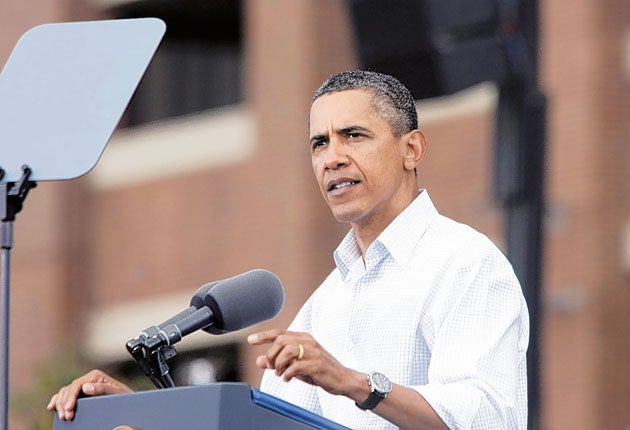Obama's new economic stimulus package set for a rough ride through Congress
President's new plan skews towards tax cuts, not because they are effective, but because they are more likely to win bi-partisan support

Your support helps us to tell the story
From reproductive rights to climate change to Big Tech, The Independent is on the ground when the story is developing. Whether it's investigating the financials of Elon Musk's pro-Trump PAC or producing our latest documentary, 'The A Word', which shines a light on the American women fighting for reproductive rights, we know how important it is to parse out the facts from the messaging.
At such a critical moment in US history, we need reporters on the ground. Your donation allows us to keep sending journalists to speak to both sides of the story.
The Independent is trusted by Americans across the entire political spectrum. And unlike many other quality news outlets, we choose not to lock Americans out of our reporting and analysis with paywalls. We believe quality journalism should be available to everyone, paid for by those who can afford it.
Your support makes all the difference.President Barack Obama will tonight press a fractious Congress to enact a new economic stimulus package worth around $300bn (£188bn), in an attempt to boost America's recovery and his own flagging re-election prospects.
After months when Washington has been consumed with partisan conflict over raising the legal limit on the national debt, polls show the President must urgently turn his attention to an unemployment rate above 9 per cent, which is the biggest stumbling block in the way of a second term.
Whether his proposed package of tax cuts and new federal spending can pass the Republican-controlled House of Representatives remains an open question, however, as he puts the finishing touches to a heavily promoted speech to a joint session of Congress.
His speech comes as Republican contenders for the White House sharpen their economic messages. Mitt Romney, the former Massachusetts Governor, released a 59-point economic plan that leans heavily on cutting taxes and regulations. Last night's scheduled Republican debate at the Reagan Library in California offered the first public match-up between Mr Romney and the Texas Governor Rick Perry, whose front-runner status rests in part on the strength of job creation in Texas.
Unlike the first $787bn stimulus package in 2009, the administration's new plan skews towards tax cuts. This is less because the President has been persuaded that these will be more effective than spending on roads and bridges, and more that the measures are most likely to win bipartisan support.
Some $200bn of the total package is expected to come from extending a payroll tax cut that was to expire at the end of this year. The rest will be made up of infrastructure spending, extended unemployment benefits and aid to recession-hit state and local governments.
The plan has also been recast as a jobs bill, dropping the word "stimulus" which was discredited when the 2009 measures failed to bring the unemployment level down to levels originally hoped.
The President's speech is the first salvo in what will be a long and potentially bitter battle over the contents of new stimulus legislation. Even the timing of the speech created rancour when the administration first proposed holding it last night, in a clash with the latest Republican presidential debate.
And Republican leaders have already put Mr Obama on notice that they are likely to oppose elements that mirror the 2009 stimulus. In a letter to the President, John Boehner, Speaker of the House, and Eric Cantor, leader of the House Republicans, said: "We argued at the time that a large, deficit-financed, government spending bill was not the best way to improve our economic situation... Given the current unemployment and deficit numbers, we believe our concerns have been validated."
Join our commenting forum
Join thought-provoking conversations, follow other Independent readers and see their replies
Comments